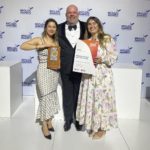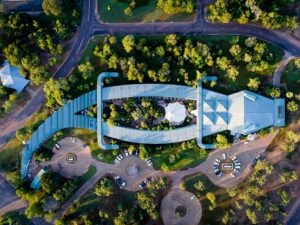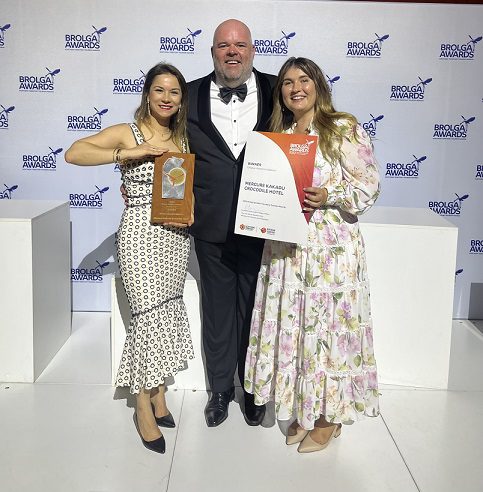 The Mercure Kakadu Crocodile Hotel (aka “The Croc”) has taken out the award for “Unique Accommodation” in this year’s Northern Territory Brolga Awards.
The Mercure Kakadu Crocodile Hotel (aka “The Croc”) has taken out the award for “Unique Accommodation” in this year’s Northern Territory Brolga Awards.
The accolade recognises not only the hotel’s unique design, but the unique role it plays in Kakadu’s economic and cultural landscape.
Fully Indigenous-owned, the Crocodile Hotel was developed by the local Gagudju Association in the 1980s, and was pivotal in opening up Kakadu to world tourism, following the spotlight shone on Kakadu National Park by the highly successful Crocodile Dundee film.
The Mercure Kakadu is built as a 250-metre long, 30-metre wide giant crocodile The hotel’s unique design was selected because Ginga, the giant crocodile, is a spirit ancestor of the Gagudju people.
The only crocodile-shaped hotel in the world, the hotel’s circular parking areas represent crocodile eggs; the hotel entrance is its gaping jaws with menacing teeth; ventilation units are housed within the crocodile’s slatted yellow eyes, which glow red at night, and the crocodile’s ‘head’ incorporates reception, an expansive marble foyer – a cool green oasis – the Escarpment Restaurant and Bar, function rooms, and the renowned Ochre Aboriginal art gallery.
The Mercure is pivotal to Kakadu’s tourism industry, being the largest hotel in the National Park, capable of hosting large groups, conferences and incentives, families and business travellers.
Originally, the hotel and the Jabiru township were meant to be bulldozed, with the area returned to its original state following the end of uranium mining in 2021. However, under a new agreement, Jabiru will be fully revitalised as Kakadu’s commercial and tourism hub, with The Croc playing an integral role in Kakadu’s future development.
The hotel is part of the Kakadu Tourism group and is managed by Australia’s largest hotel operator, Accor.
Kakadu Tourism Chair, Rick Allert, praised Group General Manager Chris Chaffe, Mercure Kakadu General Manager Jacinta Koch, and all the Mercure team for the Brolga Award, saying it was a fitting reward for all the work they had done during a highly disrupted period.
“The past two years have been challenging for the whole tourism and hospitality industry, but particularly onerous for outback destinations such as Kakadu,” said Mr Allert.
“Border closures restricted access to both guests and staff, but the team showed great resilience and initiative despite the trying circumstances.
“The hotel has continued to upgrade its product and services, with refurbishment of bathrooms beginning and the addition of Indigenous-designed features in bedrooms. 
“A major solar installation is planned for the rooftop of the hotel, which will be important for sustainability, while the hotel’s interior gardens have been totally redesigned to focus on sustainable, Indigenous plants.
“Being Indigenous-owned, the hotel plays an integral role in employing and supporting Indigenous businesses. We will be expanding the operations of the hotel’s Ochre Art Gallery, with an artist-in-residence program, which also enables guests to have first-hand interaction with local artists.
“We have increased our local Indigenous food and beverage procurement, supporting innovative enterprises such as Kakadu Kitchen and Yibekka Kakadu Tours to give visitors a real taste of Kakadu’s unique Indigenous culture.
“While it is taking longer than hoped for Australia’s international tourism to rebound, research by Tourism Research Australia prior to the pandemic showed that interest in Indigenous tourism experiences has been growing strongly, with a 42% increase in overseas and Australian visitors taking part in an Indigenous tourism experience between 2013 and 2019.
“Kakadu is an exceptional destination for visitors who want to experience the world’s oldest continuous living civilisation, and the Mercure looks forward to sharing this remarkable cultural landscape with visitors from around the world.”
Further information: www.kakadutourism.com















